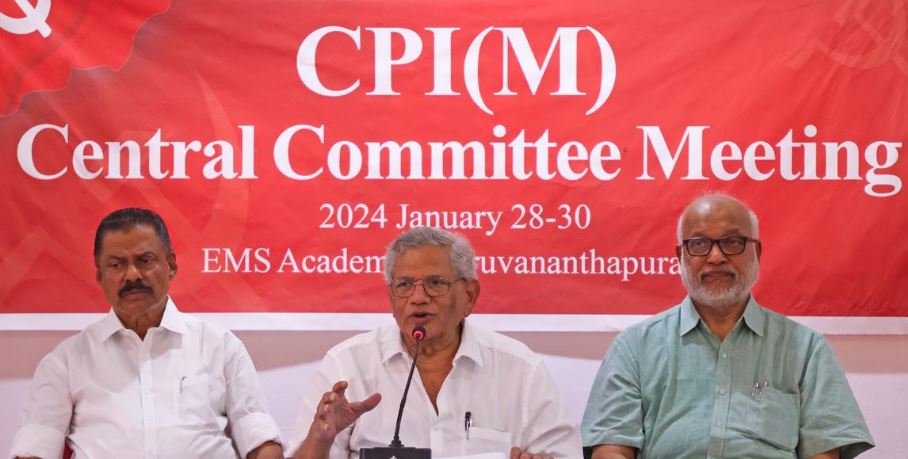In a profound introspection of the 2024 Lok Sabha elections, the Communist Party of India (Marxist)’s (CPI(M)) central committee has issued a comprehensive and candid appraisal of its lamentable performance. This review lays bare the party’s organizational frailties, its failure to counter the burgeoning Hindutva politics, and the disconcerting erosion of its traditional voter base to the Bharatiya Janata Party (BJP) in Kerala.
Hindutva Politics: A Growing Challenge
The CPI(M)’s central committee, its apex decision-making body, convened in Delhi for a three-day introspection beginning June 28. The review unequivocally noted that the CPI(M)-led Left Democratic Front (LDF) secured a solitary seat out of the 20 available in Kerala, starkly underscoring the party’s dwindling influence. This analysis reveals that a significant factor in this decline is the party’s inadequate response to the BJP’s aggressive promotion of Hindutva politics. The committee lamented the considerable gap between the party’s pre-poll estimates and the actual results, indicative of a weakening connection with the electorate. This disconnect was attributed to the party’s insufficient efforts to counter the increasing appeal of Hindutva among voters.
Organizational Weaknesses and Corruption
The review further highlighted internal maladies afflicting the CPI(M). The committee identified numerous instances of corruption within panchayats, cooperative institutions, and various other levels, which have severely tarnished the party’s reputation. Additionally, the review criticized the pervasive arrogance exhibited by party cadres, from the apex to the grassroots, which has alienated potential supporters. The necessity for a comprehensive rectification plan to eliminate these deleterious trends was emphatically underscored.
Erosion of Traditional Voter Base in Kerala
In Kerala, the attrition of the CPI(M)’s traditional voter base to the BJP was starkly manifest. Despite the party’s overall tally remaining static since 2019, the LDF’s vote share diminished by 1.75 percentage points. This decline is part of a broader decadal trend, with the LDF’s vote share plummeting by seven percentage points since 2014. Specific constituencies, such as Thrissur, Attingal, and Alappuzha, witnessed significant defections of CPI(M) supporters to the BJP. The committee’s document specifically underscored that the main reason for the BJP’s success in Thrissur was the support it garnered from the Congress base and a section of the Christian community, coupled with defections from the CPI(M)’s voter base in several locales.
Electoral Struggles in Other States
The CPI(M)’s struggles were not confined to Kerala. In West Bengal, despite the selection of competent candidates, the party’s weak organizational structure undermined their effectiveness. The absence of polling agents in 12-14% of booths was particularly concerning, highlighting severe deficiencies within the party’s local units. An extended review by the state unit is scheduled for August to address these issues.
In Tamil Nadu, the CPI(M) identified similar shortcomings. Even in constituencies where the party emerged victorious, such as Madurai and Dindigul, only 40-50% of party members actively participated in the election campaign. This lack of engagement underscores the urgent need for revitalization at the grassroots level.
The Role of the Left in the Secular Coalition
Despite these setbacks, the CPI(M) has played a crucial role in rallying secular forces against the RSS/BJP and in bolstering the INDIA bloc. However, the party contested fewer seats in 2024, a reduction from 71 in 2019 to 52 this year, resulting in a diminished national vote share by 58,230 votes.
Conclusion
The CPI(M)’s central committee review paints a grim portrait of the party’s current state, marred by organizational decay, pervasive corruption, and an inability to counter the BJP’s ascendancy. The review calls for urgent and comprehensive reforms to reconnect with the electorate and restore the party’s credibility. As the CPI(M) grapples with these formidable challenges, its future hinges on its capacity to implement these changes and adapt to the evolving political landscape.
Key Learning Points
| Key Learning Points |
|---|
| CPI(M)’s introspection on its 2024 Lok Sabha election performance |
| Failure to counter Hindutva politics as a major factor in their defeat |
| Organizational weaknesses and corruption within the party |
| Erosion of traditional voter base to the BJP in Kerala |
| Electoral struggles in West Bengal and Tamil Nadu |
| CPI(M)’s role in the secular coalition against RSS/BJP |
| Urgent need for comprehensive reforms and grassroots revitalization |
Soumya Smruti Sahoo is a seasoned journalist with extensive experience in both international and Indian news writing. With a sharp analytical mind and a dedication to uncovering the truth, Soumya has built a reputation for delivering in-depth, well-researched articles that provide readers with a clear understanding of complex global and domestic issues. Her work reflects a deep commitment to journalistic integrity, making her a trusted source for accurate and insightful news coverage.



